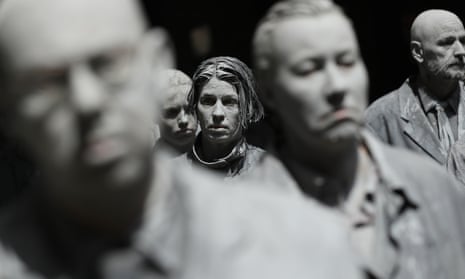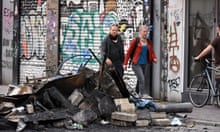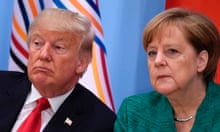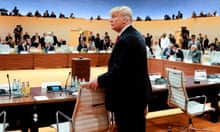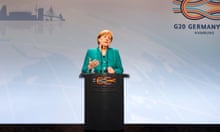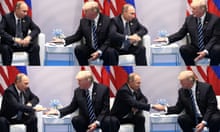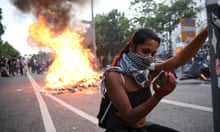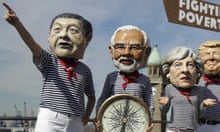Arriving in Hamburg this week feels like entering a dystopian nightmare. As the city prepares to host the G20 summit this Friday and Saturday, many roads are blocked and high-security zones have been established. More than 20,000 police, many heavily armed, are patrolling the streets, backed up by drones and the latest surveillance technology. Helicopters are permanently “parked” in the clouds, so the sound of their rotors becomes a sort of background music you soon stop noticing. Perpetual police and ambulance sirens, emergency lights and water cannons accompany the orchestra of power.
Walking on through the streets – I am here as part of the DiEM25 (Democracy in Europe Movement), which I co-founded with Yanis Varoufakis and thousands of progressive Europeans – this dystopian scene starts to feel surreal. It is as though you are trapped in a “post-truth” hallucination. Beside roadblocks and police checkpoints, I stumbled across a new ad for a popular German cola, depicting Donald Trump, Recep Tayyip Erdoğan and Vladimir Putin calmly sleeping – with the inscription “Mensch, wach auf!” (“Man, wake up!”).
The message is an appeal to the politicians who have supposedly closed their eyes to global wars, terrorism, the refugee crisis and climate change. On the other hand, it is a wake-up call to all citizens of Hamburg and beyond to organise and stop sleepwalking into a postmodern 1930s.
The current Hamburg incarnation of G20 is very different to the two most significant G20s so far – in 1999, which was an attempt to create global governance after the Asian crisis, and in 2008, in response to the financial crash.
While the “traditional” G20 was unified in either promoting or implementing the so-called Washington Consensus, it seems the new G20 can only agree to disagree.
When it comes to globalisation, Angela Merkel continues to push the idea of free trade, while Trump hews to protectionism. At the same time, even China’s “panda diplomacy” reveals that those who are supposed to be main allies can’t agree on the meaning of globalisation in the first place. Or as Merkel put it herself, after the Chinese gave Germany two giant pandas just ahead of the G20 as a token of friendship: “Beijing views Europe as an Asian peninsula. We see it differently.”
And then there’s the fact that after Trump’s withdrawal from the Paris agreement, there is clearly no consensus on how to finally tackle climate change. And even if the rest of the G20 seems in agreement, as nations they still provide four times more public financing for fossil fuels than to renewable energy.
The recent escalation in the Gulf is another source of incongruity. Despite the fact that everyone, from Trump to Theresa May, supports the “fight against terrorism”, they continuing to make lucrative arms deals which then subsequently fuel Isis. The Saudis themselves have booked the entire Four Seasons hotel in Hamburg, behaving like kings even in Europe.
Myriad contradictions are evident in Merkel’s policies: she prevents Erdoğan giving speeches to his supporters in Germany, while at the same time is not ready to stop the controversial EU-Turkey refugee deal. Or Germany complaining over Trump’s isolationism while it imposes its own EU financial policy without coordination with others.
And here we come back to what is still missing in the German wake-up ad. The problem is not that the leaders of the authoritarian world – Trump, Erdoğan and Putin (plus the Saudis and Chinese) – are asleep: they know very well what they are doing – and they continue nonetheless.
The real problem is the dogmatic slumber of the leaders of the free world, represented at this G20 summit by Merkel, May and others, which is the origin of our current dystopian nightmare (wars, terrorism, the refugee crisis and climate change). In this sense, the current G20 is not just a demonstration of disagreement on all fronts, but – after Hamburg – whether the G20 can continue to exist at all.
